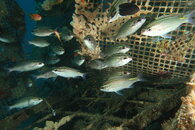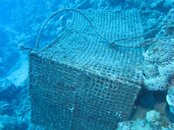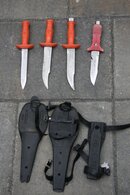With or without a dm or buddy, At some point you need to take just a teensy bit of ownership over your own fate….
You are using an out of date browser. It may not display this or other websites correctly.
You should upgrade or use an alternative browser.
You should upgrade or use an alternative browser.
Dive knives when out with a DM
- Thread starter Painter
- Start date
Please register or login
Welcome to ScubaBoard, the world's largest scuba diving community. Registration is not required to read the forums, but we encourage you to join. Joining has its benefits and enables you to participate in the discussions.
Benefits of registering include
- Ability to post and comment on topics and discussions.
- A Free photo gallery to share your dive photos with the world.
- You can make this box go away
I thought it was about freeing the big puffer or trunkfish or whatever?That trap doesn’t look particularly ghost-y to me. I haven’t come across any warm water trap (or nets for that matter) do they usually look that clean?
I have no idea what the etiquette is on that.
Thanks for the bright observation, Dr WatsonThat trap doesn’t look particularly ghost-y to me. I haven’t come across any warm water trap (or nets for that matter) do they usually look that clean?
.
Maybe because English is not my native language, sometimes I find it difficult to explain.
We have several types of local fishing in ky area: using a fishing rod (from boat, shore, jetty). Another is by dropping a cage/trap filled with bread as bait, these have a conical entry so once the fish get inside they cannot go out. Hence I name them traps. These sometimes are forgotten and with time they do not look so clean, and even without bait the fish that get inside are trapped.
Then there are nets. These are tossed from a small boat overnight, and if the drift, get caught on the reef or whatever reason forgotten- they stay in the water for years, that's why I call them ghost nets. They do not require fresh bait to become lethal, just by their presence that are nad news for the fish who happen to be around them.
All the above require some cutting tool to deal with. I mentioned them as an example that cutting tool can be used not only to free oneself from entanglement, but also to free fish, etc.
I couldn't find better photo, some other examples attached
Attachments
Waterwulf
Contributor
It's better to not need and have than to need and not have. It's been my experience that when something goes wrong, it's usually to late to make preparations for in case something goes wrong. You have to work with what you have at the time. If I had actual possession of everything I wished for when something went wrong, I'd be the proud owner of a submarine, a minigun, a helicopter, lots of rope, a really fast car, a battle tank, a second reserve on my tank, a second reserve parachute, etc. etc.
I wear a RBFK (R for really) on my inner calf, a smaller knife on the front of my BC and a line cutter also on the front of my BC. I've used the line cutter lots of times to cut fishing lines, etc.. I've only ever used the little knife to cut fish bait and the RBFK as a pry bar one time but that does not detract from the importance that I place on them.
I wear a RBFK (R for really) on my inner calf, a smaller knife on the front of my BC and a line cutter also on the front of my BC. I've used the line cutter lots of times to cut fishing lines, etc.. I've only ever used the little knife to cut fish bait and the RBFK as a pry bar one time but that does not detract from the importance that I place on them.
I always wear my dive knife on my right leg. I’ve been doing that for over 60 years now, and it has served me well over the years. It is a BFK, if that’s what you call it now, but when I started out, it was simply the dive knife. It is a tool, with a serrated edge for cutting large rope, a line cutter, a sharp point, and a regular, very sharp, edge. Over the years, I’ve:
—cut an net line (~3 inches in diameter) off a boat’s prop.
—cut two dead Republic of Korea pilots who were ejected through their T-33 canopy into the Yellow Sea out of their parachute lines/harness to recover their bodies.
—Pried some large scallops off their rock (they tasted very good).
—cut numerous fishing and other lines that I become entangled with. Once, it was a throw line that wrapped around my thumb that I cut before the current really tightened the line’s half hitch on my thumb.
—Pried numerous (pounds worth) of lead sinkers out of cracks in rocks in the various rivers I where I dive.
—Dug fishing lures and golf balls out of cracks in the river rocks.
So I won’t go diving without my dive knife. It is almost instantly there when I need it, and with diving you never really know when you may need it. Here’s an example.
SeaRat
PS, below are my dive knives that I have used. The Wenoka knife on the right is my current knife.
—cut an net line (~3 inches in diameter) off a boat’s prop.
—cut two dead Republic of Korea pilots who were ejected through their T-33 canopy into the Yellow Sea out of their parachute lines/harness to recover their bodies.
—Pried some large scallops off their rock (they tasted very good).
—cut numerous fishing and other lines that I become entangled with. Once, it was a throw line that wrapped around my thumb that I cut before the current really tightened the line’s half hitch on my thumb.
—Pried numerous (pounds worth) of lead sinkers out of cracks in rocks in the various rivers I where I dive.
—Dug fishing lures and golf balls out of cracks in the river rocks.
So I won’t go diving without my dive knife. It is almost instantly there when I need it, and with diving you never really know when you may need it. Here’s an example.
SeaRat
PS, below are my dive knives that I have used. The Wenoka knife on the right is my current knife.
Attachments
I carry 2 cutters on every dive, trilobite style with one side a shielded ceramic blade for cutting line, webbing etc, the other side is a serrated titanium blade with a moveable shield to allow for cutting larger diameter line/rope etc. Ive used them on a number of occasions, mainly to free marine life from nets, remove ghost net/line etc. I've used it once to cut mono someone had swum into and snagged on their fin strap.
I agree with formernuke. Beter to have and not needed. I carry 3. A small knife, shears and a line cutter.
I think of a dive knife as more of a tool, than a weapon. I often dive shipwrecks along coastal New Jersey, which are also popular fishing sites -- with no shortage of potential for ensnarement from fishing net or line (the latter of which is often attached to hooks). My knife has a blunt tip, so I do not accidentally cause personal injury or damage to equipment. My knife also has a metal endcap on the handle, which can double as a hammer. I also carry other cutting devices, but that may digress from the original question.
I do not expect a divemaster or guide to be impervious from also possibly requiring extrication from such entanglement. I choose to carry a dive knife to save a life, not to take one.
I do not expect a divemaster or guide to be impervious from also possibly requiring extrication from such entanglement. I choose to carry a dive knife to save a life, not to take one.
rcscubadiver
New
I encourage divers to carry knives so I can add them to my collection when I find them on the seafloor.I have done most of my dives with dive ops in Florida and the Caribbean, and all of those with at least one DM or guide.
I have never carried a knife, and I have never had the need for one in over a hundred dives.
Recently I was on a boat out of Jupiter, FL and I counted at least four divers with knives, one of which was a big honker strapped to the diver's leg that made him look like he was going into combat.
I have no objection to anybody carrying anything that makes them feel more comfortable on a dive (though a teddy bear would get a little soggy). How many of you carry a knife on guided dive trips and why?
AMEN Bob !!!BFK - What else would you use to cut cheese & fruit, and spread peanut butter during a SI?
Similar threads
- Replies
- 99
- Views
- 7,560
- Replies
- 117
- Views
- 7,066
- Replies
- 27
- Views
- 2,829
- Replies
- 319
- Views
- 17,385
- Replies
- 2
- Views
- 307







